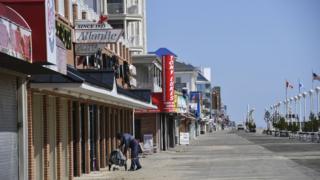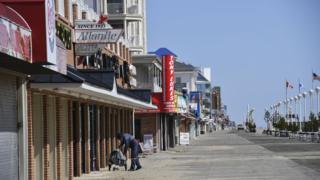Coronavirus: US weekly jobless claims hit 6.6 million
Coronavirus: US weekly jobless claims hit 6.6 million
-
9 April 2020
-
Share
These are external links and will open in a new window
-
Share this with Email
-
Share this with Facebook
-
Share this with Messenger
-
Share this with Messenger
-
Share this with Twitter
-
Share this with Pinterest
-
Share this with WhatsApp
-
Share this with LinkedIn
Copy this link
-
 Image copyright
Image copyright
Getty Images
Business closures have put millions of people out of work
The number of Americans seeking unemployment benefits has surged for a third week as the economic toll tied to the coronavirus pandemic intensifies.
More than 6.6 million people filed jobless claims in the week ending 4 April, the Department of Labor said.
To shore up the economy, the Federal Reserve said it would unleash an additional $2.3tn in lending.
The deepening economic crisis comes as the number of virus cases in the US soars to more than 430,000.
Over the last three weeks, more than 16 million people have made unemployment claims, as restrictions on activity to help contain the virus force most businesses to close and put about 95% of Americans on some form of lockdown.
“Today’s report continues to reflect the personal sacrifice being made by America’s workers and their families to slow the spread of the coronavirus,” Labor Secretary Eugene Scalia said.
The surging joblessness is a stark reversal for the world’s biggest economy where the unemployment rate had been hovering around 3.5%. Economists now expect that rate has hit the double digits.
The crisis has prompted dramatic government relief efforts.
The central bank programmes on Thursday, which include loans to local governments, are the latest actions by the Fed, which has also slashed interest rates, eased banking regulations and announced other programmes aimed at supporting home loans, currency markets and small businesses.
Fed Chairman Jerome Powell said the bank is using its emergency powers to “unprecedented extent”.
“We will continue to use these powers forcefully, proactively and aggressively until we’re solidly on the way to recovery,” he said.
The US Congress has also passed a roughly $2tn rescue bill, which funds direct payment for households, assistance for businesses and increased unemployment benefits. Lawmakers are now discussing further relief.
But the number of people and firms seeking assistance has overwhelmed rescue efforts so far.
In New York, Lou Benavides, who works in the music industry, has tried for weeks to register for jobless benefits, but cannot reach the Labor Department to finish processing his claim.
“There was one day when I made like 300 calls,” he said. “I still have not spoken to a human being.”
‘Soften the shock’
The shutdowns due to the coronavirus have now affected a majority of the roughly 21 million jobs US employers have added since recovery from the financial crisis started in 2010.
While the 6.6 million jobless claims filed in the US in the week to 4 April is actually a slight dip from the 6.8 million registered the week before, economists warn that the elevated figures are likely to continue.
“The stimulus from the US government and the Federal Reserve will soften the shock to some degree. But with business restrictions and closures still in place, the coming weeks will likely reveal more people facing income and job losses,” said Robard Williams, senior vice president at Moody’s Investors Service.
More than 80% of the global workforce has been affected by full or partial business closure due to the pandemic, according to the International Labour Organization, which is part of the United Nations.
“It’s frustrating, it’s scary,” said New Yorker Kayla Borges, who husband’s catering job was cut in recent weeks. He has been unable to reach officials to complete his unemployment claim. “With one pay cheque it’s rough. It’s definitely not something that we’ve planned for.”
But Mr Powell said the US economy entered the current crisis on a strong footing, which should help recovery, assuming the virus is contained and health authorities devise a careful back-to-work plan.
“There is every reason to believe that the economic rebound when it comes can be robust,” he said.
![]()


